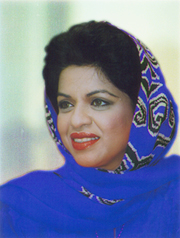 |
| shahrizat umno woman of glamour |
 |
| Monday April 9 MTUC plans to go ahead with EPF picket Susan Loone 6:28pm, Mon: The Malaysian Trades Union Congress (MTUC) will go ahead with its planned picket outside the Employees Provident Fund (EPF) building in Kuala Lumpur on May 12 if its general council agrees to the proposal, MTUC president Zainal Rampak said today. Responding to Prime Minister’s Dr Mahathir Mohamad’s criticism against the move yesterday, Zainal said that the general council will meet on April 20 to decide whether to stage the picket to protest against the six percent dividend rate for year 2000 - the lowest in 26 years - announced by EPF in February. Yesterday, Mahathir criticised MTUC for planning to picket against the EPF, saying such an approach would not solve anything. He also said that now is not the time to raise issues because the country “is facing a lot of problems”. Zainal, however, said the MTUC had a responsibility towards workers. “We have argued in the EPF board to be given a higher dividend, but unfortunately we lost,” said Zainal in his speech at an MTUC forum on women workers’ rights in Petaling Jaya. “There are only five MTUC representatives on the EPF board compared with 18 employer representatives. Both the decisions of the majority and minority were submitted to the Finance Ministry. Unfortunately, the decision of the majority was upheld,” he said. He said that the picket, proposed by the general committee last Friday, was meant to urge EPF to be careful in its investments because there is a possibility that due to more ‘unrealised losses’, the dividend rate may go down to 2.5 percent - the lowest possible allowed by the EPF Act 1991. No choice To Mahathir’s comment that MTUC did not meet with him to talk about the picket, Zainal said that the congress meets the prime minister once a year to discuss workers’ issues and they have yet to convene this year since the June 25 meeting last year. He refuted Mahathir’s statement that the picket will jeopardise the country’s economy, stating that the workers will be staging the picket outside their working hours. “We do not mean to make matters worse. We have no other choice,” said Zainal, adding that during the last financial crisis, workers did not stage pickets or strikes because they understood the economic situation of the country. “But the question is we had an 8.5 percent growth last year and workers are asking how come EPF’s dividend is only six percent?” he said. On EPF taking up the unsubscribed portion of Time dotCom shares, Zainal said that MTUC representatives were not on the investment board. He said he was invited to join the board, but declined when he was told that the board was only answerable to the Finance Ministry and not the EPF board. Zainal also claimed workers had rejected Mahathir’s call to reduce their EPF contribution from 11 percent to nine percent as part of a RM3 billion stimulus package to boost the economy through increasing spending (Workers' EPF reduction compulsory, March 29). Gender equality Women and Family Development Minister Shahrizat Abdul Jalil, who opened the forum, however, urged Zainal not to encourage women to join the picket. “Please do not teach them to do the wrong thing,” she said in her speech, adding that the correct way to handle the issue was through discussion and negotiation. “I am afraid that when women are taught to do the wrong thing, someday when their husbands cut their allowances by 50 percent, they will close the kitchen and picket outside the house,” she added, much to the amusement of all those who were present. She advised women workers not to be pressured by the men and to support only the good things proposed by MTUC. She said the situation of women workers in Malaysia was better off than that of their counterparts in other countries. “We do not have to riot like those in Indonesia, we do not have poverty like those in the Philippines, nor do we need to engage in prostitution like women in Thailand,” she said. She added that EPF’s six percent rate was better off than a bank’s interest rate which is about two to three percent. T Pathma, a past president of MTUC women’s section and one of the speakers at the forum, told reporters she was disappointed with Shahrizat’s appeal to women not to picket. “It is wrong to ask women to marginalise themselves from a movement which believes in unity in strength. We practise gender equality here. We talk about workers’ rights and not women’s rights,” said Pathma. She added: “It is all right if she had appealed to MTUC as a whole not to picket. Instead she is telling women to become weak and to go back home to the kitchen when a major event of the world agenda now is to encourage integration of women in trade unions.” |
 |
| Friday January 19 First women’s affairs minister slammed for unsupportive remark Ajinder Kaur 7:07pm, Fri: Several women’s groups have taken to task newly-appointed Women’s Affairs Minister Shahrizat Abdul Jalil for her reference to the reinforcement of women’s basic and traditional functions as one of the priorities her new ministry will look into. The All Women’s Action Society (Awam) president Dr Mary Suma Cardosa said today that Shahrizat’s statement was against women’s struggle towards ending discrimination between the sexes. Shahrizat was quoted in The Star today as saying that one of the three grey areas that she would be looking into was to reinforce women’s basic and traditional functions like cooking and caring for the household. Cardosa said in a press statement, “We wish to point out that women, by entering into the job market, have taken on an additional burden. Despite contributing to the household income, we women still assume responsibilities at home.” She added that as women take on more roles outside the home, likewise men should take on roles inside the home. “This role should be gender neutral. The double burden of women has existed always and still exists today,” Cardosa said, adding that she did not see a need to reinforce women’s traditional functions. Conflicting statement Shahrizat was also criticised by the Women’s Aid Organisation (WAO), which said that her statement was conflicting. Its executive secretary Ivy Josiah said that while on one hand Shahrizat “wants to mainstream women’s issues and bring women to the fore, she also plans to remind women of their traditional functions”. “To reinforce traditional roles for women is a step backwards as it implies that a woman’s primary role is to cook and clean even as they pursue careers and interests outside of the home,” she said. Josiah added that the new ministry should be looking into eliminating discrimination by breaking stereotypes and freeing women from their traditional roles to take their rightful place in the mainstream. Crux of women’s oppression Meanwhile, the Women’s Agenda for Change (WAC), a coalition of non-governmental organisations, stressed that these traditional functions have been the crux of women’s oppression. WAC organising committee coordinator Maria Chin Abdullah said in a press statement that Shahrizat should re-set her priorities and take action to meet the demands of the “new” women in Malaysia. “While recognition is given to women in terms of their work in the household, we would like to question the role of the men which seems to be silent in her tasks for the ministry,” Maria said. Maria, however, said that by emphasising women’s traditional roles and yet saying that women have moved into the new millennium, Shahrizat had ignored the fact that women have been playing multiple roles for centuries and were now ready for change, that is, to have a new partnership with men, based on women’s terms. Maria also said that women’s organisations have already had several discussions with Shahrizat and presented their concerns and recommendations. “One such effort has been the drawing up of the Women’s Agenda for Change and its subsequent 30 do-able actions. “We would like the minister to begin from these plans rather than going back to an earlier stage of trying to understand the issues,” she said, adding that Shahrizat has yet to respond to the recommendations though she was reported to have said that her first task in the new portfolio would be to get as much feedback from women-based NGOs. WAC is a lobby group which calls for gender-equality and the eradication of discriminatory laws against women. Its main priority issues include increasing women’s representation in parliament and state assemblies by ensuring a 30 percent quota for women at all decision-making levels of the government, public services and elected representatives. |